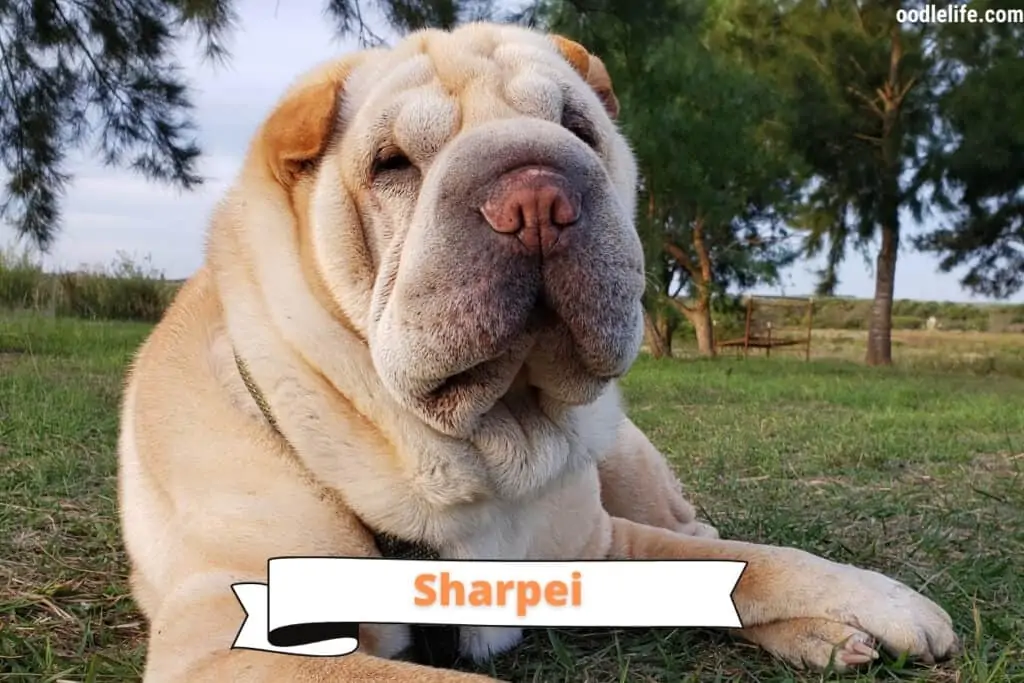My Dog Ate Fish Food [Should I Be Worried?]
As pet owners, we have a strong natural instinct to protect our dogs from harm. They’re our friends, our partners in crime, and valued members of our families. They can also be curious, super active, and a little bit sneaky. They want to explore the world and don’t know of the risks that await them. This combination of traits makes protecting them from danger our top priority.
People who love animals often own more than one type of pet at the same time. Owning a dog and a pet fish is not uncommon. Dogs require lots of exercise and one-on-one attention, while fish are calming, pretty to look at, and need basic maintenance.
They’re two very different animals who won’t fight or make a mess together. Seems like a great combination. But what happens when your dog gets into your fish’s food? Is it dangerous? What can be done to prevent a dog from eating fish food?
Why Would My Dog Eat Fish Food?

Sniffing and tasting are two of the main ways dogs explore their surroundings. They’ll put their faces into anything that smells interesting, and if it seems edible, they’ll dig in. Almost every dog owner has a close-call story about their four-legged pal eating (or almost eating) something potentially dangerous.
Most of the time, the pup ends up fine, but the feeling of helplessness and anxiety a pet parent feels in those moments of uncertainty stays with them forever.
Fish food could smell pretty yummy to your canine. It contains meat and oils that are fragrant and attractive to your pup’s sense of smell. It could smell similar to their own food, but foreign and exotic at the same time.
Some dogs love to eat cat food, fish food, or whatever foods their fellow house pets like to consume. It’s a matter of wanting to see how the other half lives, along with a touch of pet-sibling rivalry. A bag of fish food left out for your doggy could be a tempting call to mischief that ends with a mess on the floor and their owner a bundle of nerves.
The Possible Dangers of Fish Food for Dogs

First off, let’s take a look at the main ingredients of fish food. The primary ingredient of fish food flakes is usually protein meal; most often fish meal. It may also contain peameal, which is a vegetarian protein alternative.
For carbs, fish food may use corn meal, wheat, or rice. This doesn’t sound too different from dog food, does it?
Many pet foods indeed have similar ingredients, but fish food contains a high amount of protein that exceeds what a dog needs in its everyday diet.
It’s no surprise that a regular diet of fish food would not be good for a dog at all. It could lead to high cholesterol and other health problems for a dog. Fish food may also contain oils, hormones, or other ingredients that are specific to fish’s needs, and these may be irritating to a dog’s stomach even when eaten once.
Stomach Upset
If your dog consumes fish food, don’t panic. It’s most likely your dog will be okay, especially if they only ate a small amount.
However, if they chow down on a larger amount of fish food, your pup may experience some symptoms of an upset stomach, like vomiting or diarrhea. These are generally mild, and resolve on their own, but in some cases, they may last longer than they should.
If your dog is very young or very old, small in size, or has a pre-existing health condition, it could have a harder time recovering from the results of eating fish food.
Allergic Reaction
Allergic reaction is an uncommon but possible result of a dog eating fish food. While a somewhat rare occurrence, dogs can have allergies to fish, corn, or other ingredients in fish food.
The vet would treat your dog and make sure that you have your dog on a diet that excludes the allergen. Sometimes this means a special prescription diet.
Gut Bacteria Imbalance
Insect larvae are another possible culprit in fish food. While fine for fish to eat, larvae could possibly cause your dog to suffer from stomach upset.
Dogs’ stomachs are a lot stronger than ours, enabling them to eat things that would make us cringe. However, like our stomachs, dogs’ stomachs depend on a delicate balance of gut bacteria.
The friendly bacteria fight off the bad bacteria and enable them to be healthy and happy. If that balance gets upset by fish larvae, your dog could be in for a long-lasting tummy ache.
Always use your common sense and intuition. Observe your dog closely after they’ve eaten fish food. Don’t hesitate to contact your veterinarian if you have any questions or concerns.
Your vet knows that pets can get into unintended foods and will know the proper course of action to take to help your dog get back to its normal, playful, healthy self.

Preventing Your Dog From Eating Harmful Foods
Keeping up with your pets’ desire to munch on forbidden foods isn’t always easy, but there are some simple ways to prevent them from this troublesome behavior.
It’s important to properly store any products that might be harmful to your dog, and this goes for fish food and other types of non-dog pet foods as well.
Keeping products in a cupboard with a pet-proof lock is one good way to prevent your curious pooch from eating your fish’s food. You can also store pet foods in snap-locking plastic storage bins away from where your pet can access them.
Remember to give your dog an appropriate amount of pup-friendly treats of their own to satisfy their craving for new and adventurous tastes.
Taking these simple precautions can help you protect your dog from experiencing the uncomfortable symptoms of eating fish food or any other type of food that isn’t designed with their unique digestive systems in mind.